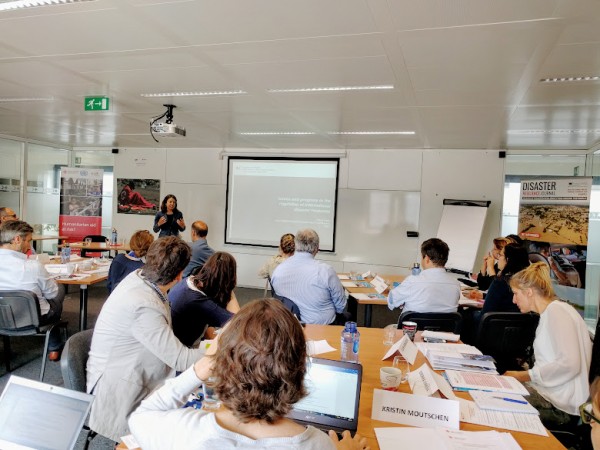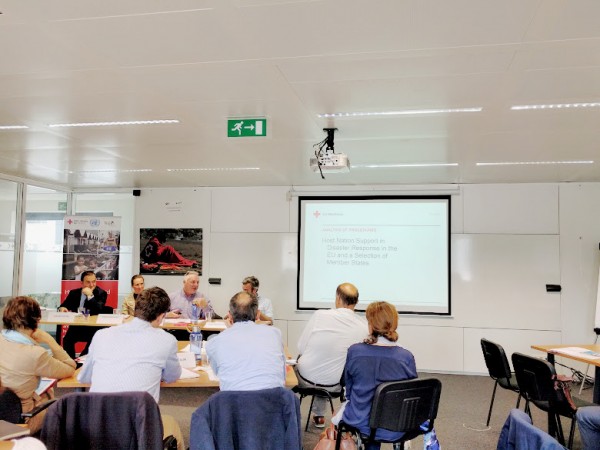Coordinating Effective Responses for When Disaster Strikes
On 28 June, the Red Cross EU Office and the International Federation of the Red Cross Red Crescent (IFRC) hosted an interactive workshop on the International and Legal Frameworks for International Disaster Response (IDRL) at the Global and European levels. The event welcomed stakeholders from a variety of organisations, including the European Union institutions, the North Atlantic Treaty Organisation (NATO), UN Agencies, and Voluntary Organisations in Cooperation in Emergencies (VOICE) to discuss progress and challenges in disaster response laws.
When a major disaster strikes, swift delivery of aid to those affected is of the utmost importance. However, inefficiencies in regulations and norms can significantly hinder the impact of incoming assistance. For the past 15 years, the IFRC and National Red Cross and Red Crescent Societies have compiled research showing that most states — including those with frequent disasters – have few rules on international relief in their domestic system. The adoption of appropriate legislation is essential to ensure that aid is delivered in a quick and efficient manner, avoiding unnecessary road blocks.
There is a growing need for legal preparedness due to the rising frequency, severity and impact of disasters, as well as an increase in the number and diversity of responders. The IFRC actively works to mitigate IDRL challenges through discussions on the development and implementation of IDRL. Since the creation of the Domestic Facilitation and Regulation of International Disaster Relief (IDRL guidelines) at the 30th International Conference of the Red Cross Red Crescent in 2007, IDRL continues to be high on the agenda at all subsequent International Conferences. The IDRL guidelines presently assist 23 countries in examining and updating their existing laws and procedures. A further 17 countries are currently drafting bills, policies and regulations.

"It’s easy for humanitarian organisations to think about sending assistance, but in many cases they don’t think about what is needed in order to receive assistance. Many countries can be caught unprepared when disasters occur in their own backyard,” said Tessa Kelly, coordinator ad interim from the IFRC Disaster Law Programme.
The latest research from the IFRC demonstrates that strong IDRL responses are needed to address recurring regulatory problems, such as unnecessary barriers to the entry of international personnel, goods, equipment and programmes. Oversight gaps in the quality, appropriateness and complementarity of relief efforts also pose significant barriers to effective aid. This was clearly evident in the case of the Nepal earthquake in 2015 for example, where relief items were stranded in customs for 12 months due to a lack of properly implemented IDRL. While IDRL guidelines were reviewed and developed, they had not been adopted into national legislation, which caused significant and otherwise avoidable delays in getting goods and services to people in need.
Complimentary to the IDRL guidelines, are the IDRL Draft Articles from the International Law Commission (ILC)— a UN body of legal experts elected by states to promote the "progressive development of international law and its codification”. The Draft Articles on the Protection of Persons in the Event of Disasters aim to facilitate responses to disasters that meet the essential needs of the persons concerned. In 2014, under the solicitation of the ILC, the IFRC provided input for the first reading of the ILC Draft Articles, based on its long-term experience in responding internationally to disasters around the world.
During the workshop, John Roche, Head of the International Department at the Irish Red Cross also presented the outcomes of the "EU-IDRL study,” a project supported by the European Civil Protection Financial Mechanism, and intended to aid EU Member States in developing their approach to "host-nation support” in cross-border disaster situations.

"In disaster preparedness, it is better that you learn and prepare for disasters in advance rather than learning on the day of the disaster,” said John Roche.
From 2012 to 2014, National Red Cross Societies in Finland, Iceland, Ireland, Latvia, Poland and Italy participated in the study, which mapped key disasters that might require an international response. The study found that there is much more flexibility in countries building legislation for delivering aid overseas than there is on receiving aid within their own countries, and disaster responses can sometimes be fragmented because different departments respond to different types of disaster.
The EU-IDRL study offers the following key recommendations to improve international and cross border responses, the study: 1) the development of manuals on cross-border disaster relief that draw from EU Host Nation Support Guidelines and the IDRL Guidelines, 2) the production of training models on cross-border disaster relief (including simulations for disaster preparedness), and 3) the adoption of comprehensive domestic policy strategies that ensure full coordination between implicated departments.
To gain some practical experience of potential approaches and challenges, workshop participants carried out an interactive group assignment, where they worked together in teams to analyse a hypothetical disaster, and pick the most appropriate IDRL responses. Both the informational sessions, as well as the interactive exercise, enabled stakeholders to gain greater awareness of the importance of strengthening legal preparedness for disasters, and the complexities involved in implementing IDRL.
For media inquiries, please contact Eva Oyón on: eva.oyon@redcross.eu or +32 2 235 09 22

